
The United Nations Security Council (UNSC) is one of the six principal organs of the United Nations (UN) and is charged with ensuring international peace and security, recommending the admission of new UN members to the General Assembly, and approving any changes to the UN Charter. Its powers as outlined in the United Nations Charter include establishing peacekeeping operations, enacting international sanctions, and authorizing military action. The UNSC is the only UN body with authority to issue resolutions that are binding on member states.

The United Nations General Assembly, UNGA; French: Assemblée générale des Nations unies, AGDNU is one of the six principal organs of the United Nations (UN), serving as its main deliberative, policymaking, and representative organ. Currently in its 79th session, its powers, composition, functions, and procedures are set out in Chapter IV of the United Nations Charter.

The member states of the United Nations comprise 193 sovereign states. The United Nations (UN) is the world's largest intergovernmental organization. All members have equal representation in the UN General Assembly.
A United Nations General Assembly resolution is a decision or declaration voted on by all member states of the United Nations in the General Assembly.
United Nations Security Council Resolution 16 was adopted on 10 January 1947. The Council approved three documents, officially recognizing the establishment of the Free Territory of Trieste.

United Nations Security Council Resolution 17 was adopted on 10 February 1947. The Council declared that the commission established by Resolution 15 did not have the authority to request the governments of Greece, Albania, Bulgaria, or Yugoslavia to postpone any executions of political prisoners unless the commission believed they could provide testimony helpful to its work.

United Nations Security Council Resolution 19 was adopted on 27 February 1947. The Council created a sub-committee to investigate the Corfu Channel incident and the dispute between Albania and the United Kingdom.

United Nations Security Council Resolution 22 was adopted on 9 April 1947. The Council recommended that Albania and the United Kingdom take their dispute over the Corfu Channel incident to the International Court of Justice.

United Nations Security Council Resolution 23 was adopted on 18 April 1947. The Council established a subsidiary group to assist the commission investigating the alleged border violations between Greece and Albania, Bulgaria, and Yugoslavia formed by Resolution 15.
United Nations Security Council Resolution 24 was adopted on 30 April 1947. The Council deferred Hungary's application for United Nations membership to the Committee on the Admission of New Members.
United Nations Security Council Resolution 25 was adopted on 22 May 1947. The Council deferred Italy's application for United Nations membership to the Committee on the Admission of New Members.
United Nations Security Council Resolution 27 was adopted on 1 August 1947. The Council called for a ceasefire and a peaceful resolution between the parties from the Netherlands and Indonesia involved in the Indonesian National Revolution.

United Nations Security Council Resolution 28 was adopted on 6 August 1947. The Council formed a subcommittee of the representatives who proposed solutions for alleged border violations between Greece and Albania, Bulgaria, and Yugoslavia in order to create a new draft resolution.
United Nations Security Council Resolution 30 was adopted by on 25 August 1947. The parties from the Netherlands and Indonesia involved in the Indonesian National Revolution agreed to comply with Resolution 27. The Council requested that each member recall a diplomatic officer from Batavia for briefings on the situation.
United Nations Security Council Resolution 31 was adopted on 25 August 1947. The Council formed a committee to assist in the peaceful resolution of the Indonesian National Revolution.
United Nations Security Council Resolution 32 was adopted by the United Nations Security Council on August 26, 1947. The Council formally reminded both sides of the Indonesian National Revolution to adhere to Resolution 27, which called for a ceasefire and peaceful resolution to the conflict.

United Nations Security Council Resolution 37, adopted on December 9, 1947, adapted the section of the rules of procedure for the Council governing the application for membership of new nations.

The Jammu and Kashmir Constituent Assembly was a body of representatives elected in 1951 to formulate the constitution of Jammu and Kashmir. The Constituent Assembly was dissolved on 26 January 1957, based on Mir Qasim resolution it adopted and ratified the constitution of jammu and kashmir on 17 November 1956.

United Nations Security Council resolution 683, adopted on 22 December 1990, after recalling Resolution 21 (1947) which approved the Trusteeship Territory of the Japanese Mandated Islands as well as Chapter XII of the United Nations Charter which established the United Nations Trusteeship system, the council determined that, in the light of entry into force of new status agreements for the Federated States of Micronesia, the Marshall Islands and the Northern Mariana Islands, the objectives of the Trusteeship Agreement had been completed and therefore ended the Trusteeship Agreement with those entities.

The Palestinian Declaration of Independence formally established the State of Palestine, and was written by Palestinian poet Mahmoud Darwish and proclaimed by Yasser Arafat on 15 November 1988 in Algiers, Algeria. It had previously been adopted by the Palestinian National Council (PNC), the legislative body of the Palestine Liberation Organization (PLO), by a vote of 253 in favour, 46 against, and 10 abstaining. It was read at the closing session of the 19th PNC to a standing ovation. Upon completing the reading of the declaration, Arafat, as Chairman of the PLO, assumed the title of President of Palestine. In April 1989, the PLO Central Council elected Arafat as the first President of the State of Palestine.









